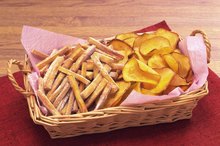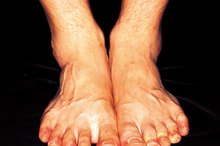Do You Retain Water Before Losing Weight?
Water retention is one of the universal boogeymen of anyone trying to lose weight. Fewer things are more frustrating than working out and eating well only to step on the scale and see that you've gained a pound or two. Don't panic. Water weight can cause a significant change in the numbers on your scale, but there are ways to keep it under control.
Sodium
Many of the foods that contribute to weight gain are high in sodium. A diet high in sodium causes your body to retain water to balance out the increase in salt. So, you were probably carrying extra water weight before you adopted healthier eating habits. When your body retains excess water, it can manifest in your tissues by swollen hands and feet, making you feel bloated and even thirsty. This extra water in your tissues will show up on the scale. The best way to combat water retention is to cut out processed foods and soft drinks and stop adding salt to the foods that you eat.
- Many of the foods that contribute to weight gain are high in sodium.
- A diet high in sodium causes your body to retain water to balance out the increase in salt.
Weight Loss
Natural Foods That Get Rid of Water Weight
Learn More
Rapid weight loss at the beginning of a diet is usually due to excreting the extra water you've been retaining. This is generally caused by a sudden, drastic drop in the amount of sodium you take in when you start making healthier food choices. This initial weight loss can be as much as 5 and 8 pounds, depending on your starting weight. But it is a false weight loss. When you get rehydrated, you'll see the number on your scale go back up a bit. This doesn't mean that you're retaining water in an unhealthy way; it means that your body is adjusting to your healthier eating habits.
- Rapid weight loss at the beginning of a diet is usually due to excreting the extra water you've been retaining.
Diet
A diet rich in water-based vegetables helps keep your body hydrated and your electrolytes in balance. The water in fresh vegetables, in combination with the fiber they contain, aids in healthy elimination, making it easier for your body to rid itself of waste. This helps shrink both the bloating in your belly constipation causes, wand the numbers on your scale. High water content foods such as watermelon and celery can help hydrate and nourish your body without adding a lot of calories to your meal plan.
- A diet rich in water-based vegetables helps keep your body hydrated and your electrolytes in balance.
- High water content foods such as watermelon and celery can help hydrate and nourish your body without adding a lot of calories to your meal plan.
Water
Does Exercise Make You Retain Water?
Learn More
One of the best ways to avoid the water retention that looks to your scale like weight gain is to stay fully hydrated. Your body needs water to perform every one of its functions properly, so providing your body with enough water every day reduces or eliminates its need to retain water. Drink between 32 and 64 ounces of water daily to ensure that you are getting enough, especially if you are exercising regularly or live in a hot climate, and you'll see fewer upsurges in those numbers on the scale.
Considerations
If you are drinking enough water, restricting your sodium intake to less than 1,000 milligrams per day and are still retaining enough water to cause swelled hands and feet and measurable weight gain, you may want to check in with your doctor. Sometimes water retention is linked to high blood pressure or issues of heart health. If you monitor your salt intake, stay hydrated and eat a water-rich diet, you should not retain water while losing weight.
Related Articles
References
- The Colon Therapists Network: The Water Health Report: How Eight Glasses a Day Keeps the Fat Off!
- Calories Per Hour: How Salt Affects Your Weight
- Harvard T.H. Chan School of Public Health. Water. 2020.
- Texas A&M Health. You asked: What is water weight? Vital Record. April 27, 2017.
- Centers for Disease Control and Prevention. Get the facts: Sodium and dietary guidelines. Updated October 2017.
- Michigan Medicine. Carbohydrates, proteins, fats, and blood sugar. 2020.
- Harvard T.H. Chan School of Public Health. Carbohydrates and blood sugar. 2020.
- Joyner MJ, Casey DP. Regulation of increased blood flow (hyperemia) to muscles during exercise: a hierarchy of competing physiological needs. Physiol Rev. 2015;95(2):549-601. doi:10.1152/physrev.00035.2013
- MedlinePlus. Benefits of exercise.
- Harvard Health. Exercising to relax. Updated July 7, 2020.
- American Heart Association. How potassium can help control high blood pressure. Updated October 31, 2016.
- Ebrahimi E, Khayati Motlagh S, Nemati S, Tavakoli Z. Effects of magnesium and vitamin b6 on the severity of premenstrual syndrome symptoms. J Caring Sci. 2012;1(4):183-189. doi:10.5681/jcs.2012.026
- Office of Dietary Supplements. Vitamin B6. Updated February 24, 2020.
- Academy of Nutrition and Dietetics. How much water do you need. Updated March 2020.
- Harvard Health. How much water should you drink? Updated March 2020.
Writer Bio
Kara Dickerson started writing in 2010, with her health and fitness-related articles appearing on LIVESTRONG.COM and eHow. She is a registered nurse on a cardiac stepdown unit, a certified personal trainer at East Tennessee State University and a fitness instructor. Dickerson received her Bachelor of Science in nursing from East Tennessee State University.









